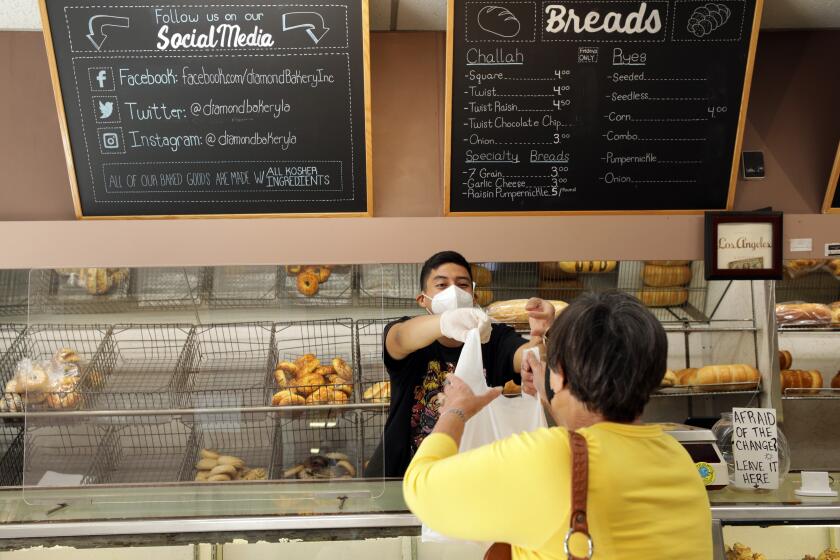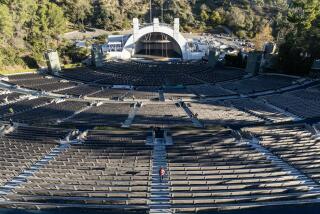Summer at the Hollywood Bowl, 2020: No concerts but food boxes for the hungry
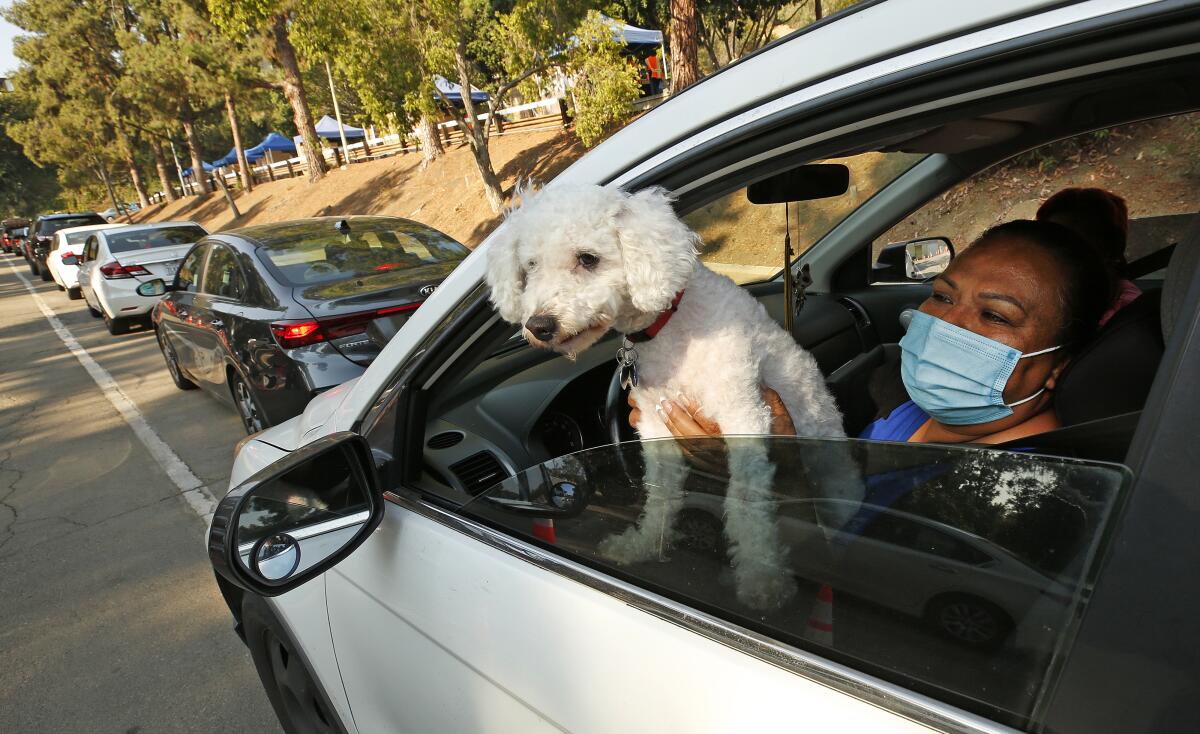
When summertime is a simpler time, so many of us find sustenance at the Hollywood Bowl.
Whether we come for symphonies or reggae or to sing along to “The Sound of Music,” to fill benches in the back or boxes right up front, to eat paté or popcorn, sip champagne or soda pop, music has a way of bringing us together.
So too, right now, does need.
On Thursday, cars snaked into the Bowl’s parking lot, with a long line stretching for blocks down Highland Avenue.
The sight was at once so familiar and so jarring, so crushing and also so comforting.
Because it was the morning, not the evening, and no concert was happening.
People were lining up to receive free boxes of food.
They came to the drive-through food giveaway, organized by the Los Angeles Regional Food Bank in partnership with L.A. County, in BMWs and Audis, in rattling old cars and in shiny new ones, in minivans loaded up with children and family pets, in pickups loaded up with paint cans and lawn mowers.
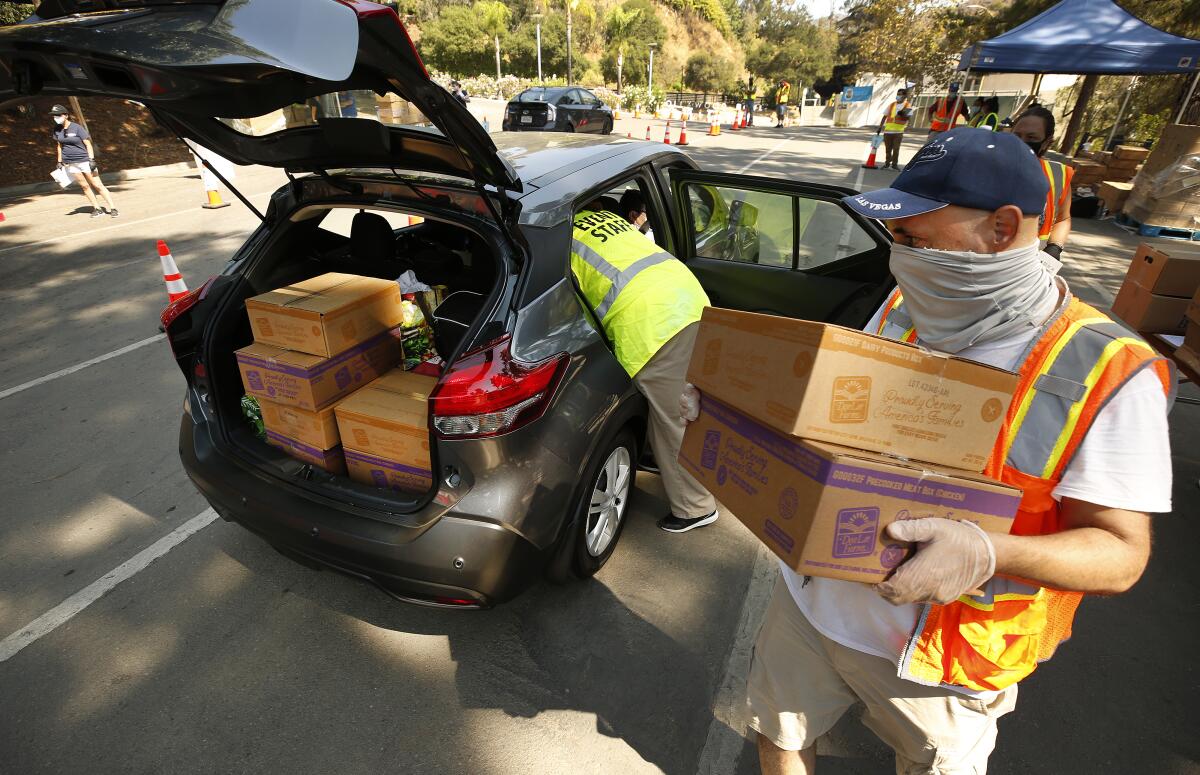
And the Hollywood Bowl, its entire season canceled by COVID-19, once again got to do what it has done for 99 years: play gracious host to a diverse and grateful crowd.
Public gathering spots and their uses are being reimagined right now. So are the ways we work and the ways we help one another, both practically and in sustaining hope.
In the food giveaway and within the complex ecosystem of the Hollywood Bowl — an L.A. County park whose operations are managed by the Los Angeles Philharmonic — examples abound of such shape shifting. All 109,000 or so L.A. County workers are disaster service workers. In a disaster, they can be redeployed, and many have been in recent months.
Gary Gero, who oversees the county’s food distribution, was until March its chief sustainability officer. Then he became director of the county’s food security branch — and went from being immersed in long-term policy on issues he described as at “the intersection of the environment, social justice and the economy” to a hands-on effort whose payoffs for the public are immediate.
The county has worked with the food bank on around 30 giveaways since April, he told me. They’ve been held all over, often at shutdown county facilities. He told me about the first one he went to, at the Downey public library headquarters, where cars lined up for more than a mile.
“I’m a policy guy so this is emotional for me to see that what I’m leading is providing something so vital,” Gero told me.
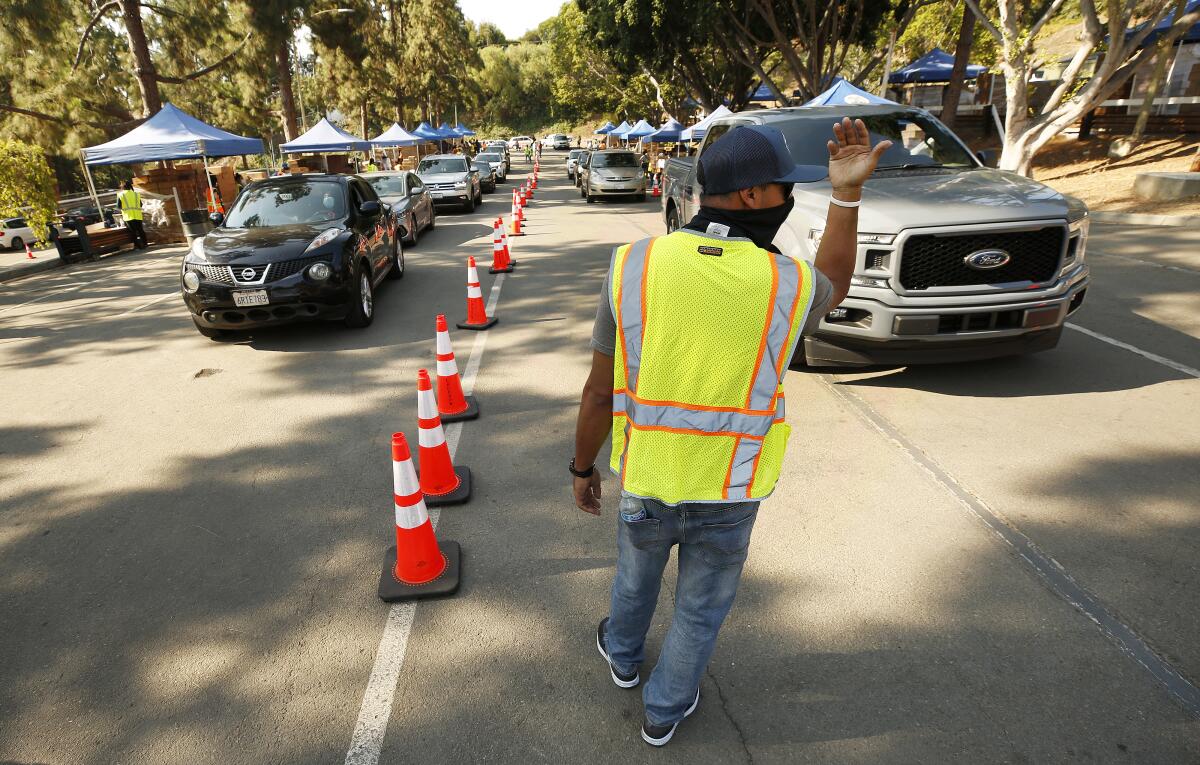
In the drive-through giveaways, people stay in their vehicles. At the Bowl, as they put them in park and sat wearing masks, food bank and county employees and volunteers placed the boxes in their trunks. I met workers from closed county parks and libraries now lifting the heavy boxes.
Patti Jack, a West Hollywood library aide, now splits her time between sidewalk service at the library and this distribution work. “There’s not one time that I haven’t shed tears” at a food giveaway, she told me.
Each household that came to the Bowl drove away with 80 pounds of food — potatoes and onions and apples, shelf-stable pantry items and meat.
Michael Flood, president and CEO of the food bank, told me that the amount of food it now distributes has more than doubled since the pandemic began. The county has allocated $10 million to pay for the pantry items.
So much is off-kilter in our world right now. Countless steady livelihoods have grown wobbly.
In the drive-through line, which formed before 6:30 a.m., I met Martin Henry of West Hollywood, who had been worried about where his next meals were coming from. He’s a personal trainer who has had no work since late March. Gyms are closed, and his clients are afraid to have him come to their homes. At 58, he now has spent his savings and has the next three months’ rent only because he received a grant.
“It’s the difference between being homeless and not,” he told me. “Like a lot of people, I’ve found myself in a situation that I didn’t expect.”
I met Aracely Rendon, who does office work at a law firm and has yet to be called back in. Her husband was unemployed for two months. Her daughter hasn’t been able to go back to working rides at Knott’s Berry Farm. She and her friend, Gilda Martinez, a housekeeper who hasn’t earned in two months, made the trip in from Paramount with Martinez’s dog Max.
When I went up to one car, I noticed an L.A. Phil parking tag hanging from the rearview mirror. The driver was Venezuelan trumpeter Gaudy Sánchez, an advisor to YOLA, Youth Orchestra Los Angeles, founded by his compatriot Gustavo Dudamel. Like the L.A. Phil’s music and artistic director, Sánchez comes out of El Sistema, the Venezuelan national youth orchestra on which YOLA is modeled. He was in line, he told me, with his wife and daughter in tow, to pick up food for a struggling YOLA family. The grandmother is sick. The mother is taking care of the kids. Three of the kids play with YOLA, which provides free instruments, music instruction, leadership training and academic support to 1,300 young L.A. musicians.
Sánchez told me his salary has been cut by 20% at the L.A. Phil, which has been hard hit without performance revenue.
The L.A. Phil has canceled concerts through the end of the year. No one can say what comes after. The economic impact on the organization already has been severe, I learned from L.A. Phil CEO Chad Smith and Chief Operating Officer Gail Samuel, who also is president of the Hollywood Bowl.
The shutdown “kind of hit like a truck when it hit,” Smith told me. Right away, canceling the remainder of the L.A. Phil’s 2019-20 season meant a loss of $9 million to $10 million. Subtract $80 million more from having to cancel the Bowl season, then an additional $10 million for the scrapped fall L.A. Phil schedule. To help fill the hole, the organization took nearly $21 million out of its endowment.
A lot of part-time employees lost their jobs. Fifty full-time employees were furloughed, along with the entire Hollywood Bowl Orchestra. The Bowl usually hires about 1,000 seasonal employees, many of whom return year after year. Sadly not this year, said Samuel.
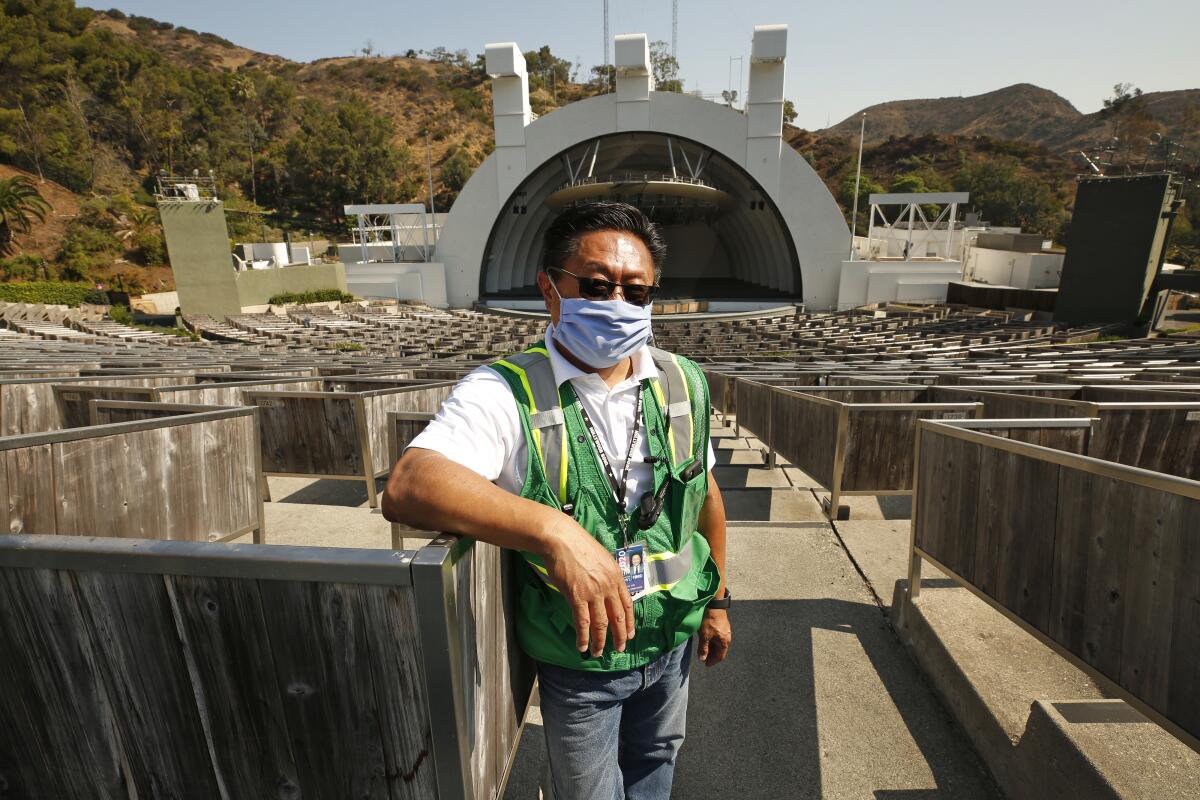
On Thursday, I stood in the empty amphitheater with Ed Tom, the Bowl’s director of operations, who started as a teenage usher 48 years ago. Coyotes, he told me, sometimes roam the empty seats at night. I wondered if they ever take to the stage for an echoing chorus of howls.
Tom’s summertime staff of 500 is down to 17, he said, but he works daily to keep the Bowl ready to go the minute it can welcome us back in.
All L.A. Phil salaries have been cut. Orchestra musicians now earn 65% of weekly minimum scale.
When I talked to musicians and others in the L.A. Phil family this week, I heard about plenty of strain but also unexpected pleasures and anticipation for the future.
Victoria Dinu, furloughed from the job she has held for two years as a corporate sponsorships coordinator, was visiting New York’s Hudson River Valley when I reached her, enjoying the outdoors. She said she’d learned L.A. from working events at the Bowl, encountering people who’d been coming for decades, couples who’d met there, workers of all ages swapping stories.
Once the pandemic hit, she and her roommates couldn’t swing their apartment rent. She moved in with her partner. She’s learning to cook. Before she ate out and didn’t even own plates. She’s proud of herself for adapting, and already dreaming of “the rumble and excitement” of a peopled Bowl. “I think it will be almost a spiritual, religious experience,” she told me.
Akiko Tarumoto and her husband, Nathan Cole, both are violinists in the L.A. Phil Orchestra. This week, their 7-year-old and 5-year-old twins started virtual school — and virtual kindergarten is sure to be challenging. Some orchestra members have had to sell their houses, she told me. A few are thinking of leaving. All long to exercise the expertise they have spent their lives honing.
“When it hits you, we can’t even do our profession, we can’t perform, we can’t as an orchestra make music... We’ve gone through a lot of stages,” she said.
Still, Tarumoto feels lucky — for the extra family time, the extra practice time, the opportunity to play duos with Cole, whose online teaching has softened the cuts.
So has the online and socially distance teaching of Mindy Ball, principal harp for the furloughed Hollywood Bowl Orchestra, which she’s played in for 25 years. She hasn’t lost a student yet, she told me, and she’s continuing to get paid through September by the Pacific Symphony Orchestra, her other musical home for 41 years. She has a place in Lake Arrowhead to escape to and float in a boat on the water.
“I was just thinking about how darkened and silenced we’ve all been,” she said. “To try to get through this, we really need to look forward with hope and a feeling of joy.”
Diamond Bakery on L.A.’s Fairfax Ave. has survived a lot over 74 years. Loyal customers and a GoFundMe campaign hope to carry it through the pandemic.
The Bowl family wants to help us do that — as best we can right now — by finding new ways to share the experience.
In June, Suzanne Goin and Caroline Styne, who run Hollywood Bowl Food + Wine, started offering take-out versions of the meals usually prepared for concerts for pickup on Thursday through Saturday nights from the Bowl’s now empty main parking lot. On the menu are favorites such as Spanish fried chicken and barbecue for two, as well as three-course themed meals.
“We just wanted to keep the spirit of the Bowl alive, and to keep our core team working,” said Goin, who has been busy reconfiguring her restaurants, navigating safety protocols and Paycheck Protection Program loans, and advocating through the Independent Restaurant Coalition for help to keep local restaurants and bars alive.
“It’s what so many of us are having to do right now — to keep changing and shifting and adapting to try to figure this out,” she said.
So too at the L.A. Phil, which recently announced an on-air series with KCRW that will broadcast previously recorded concerts from KCRW’s World Festival. Last week, KCET launched a new weekly TV show, “In Concert at the Hollywood Bowl,” also airing past concerts, with Dudamel as host.
Members of the orchestra actually came together at the Bowl recently over two weeks to record a new concert series called “Sound/Stage” tailored to this moment we’re in — that will start streaming Sept. 25. Musicians were spaced out on the Bowl’s stage, each six feet apart from the next person, most masked. The wind and brass players were behind layers of plexiglass.
“It was kind of like giving somebody a hug through a garbage bag,” joked Tom Hooten, principal trumpet, who said more seriously that “it was great to make music.”
As for a hug from the Bowl, however distant and awkward, I think a lot of us right now would open our arms wide for it.
More to Read
Sign up for Essential California
The most important California stories and recommendations in your inbox every morning.
You may occasionally receive promotional content from the Los Angeles Times.
